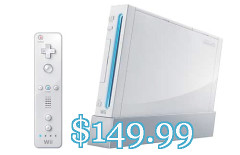 Although it’s cute to say, the truth of the matter is this: Rock Band 2 for the Wii has DLC. We’re talking full online downloadable content matching the behavior of the Xbox 360 and PlayStation 3. Why is this significant?
Although it’s cute to say, the truth of the matter is this: Rock Band 2 for the Wii has DLC. We’re talking full online downloadable content matching the behavior of the Xbox 360 and PlayStation 3. Why is this significant?
The Wii has been the bastard child of rhythm music playing since its inception. If you’ve got the Wii and one of the other consoles (sans PS2) you’re probably more likely to purchase for the 360 or PS3 because you can extend the game with great downloadable songs. Breathing new life into your console one dollar at a time can be a life saver if you don’t typically buy a lot of games; let’s face it, Wii gamers don’t buy a lot of games.
This news also brings on the announcement of real online play like the other consoles. The Wii will have online play matching that of the 360 and PS3; without the ability to talk to your fellow band mates we’re guessing. Is it fun to play in a band with a bunch of mutes? Better than nothing I guess.
This begs the question, how will it store all the DLC? As a Rock Band addict I must admit to having several hundred megabytes of downloadabe songs. Will this be all resident on the SD card? We also wonder, will this allow us to play Rock Band DLC on our DSi sometime in the future?
(Thanks, Kotaku)

 If you purchased Rock Band 2 you’ll find you can download 20 free songs if you register at
If you purchased Rock Band 2 you’ll find you can download 20 free songs if you register at  Nintendo has
Nintendo has  Microsoft recently announced their
Microsoft recently announced their